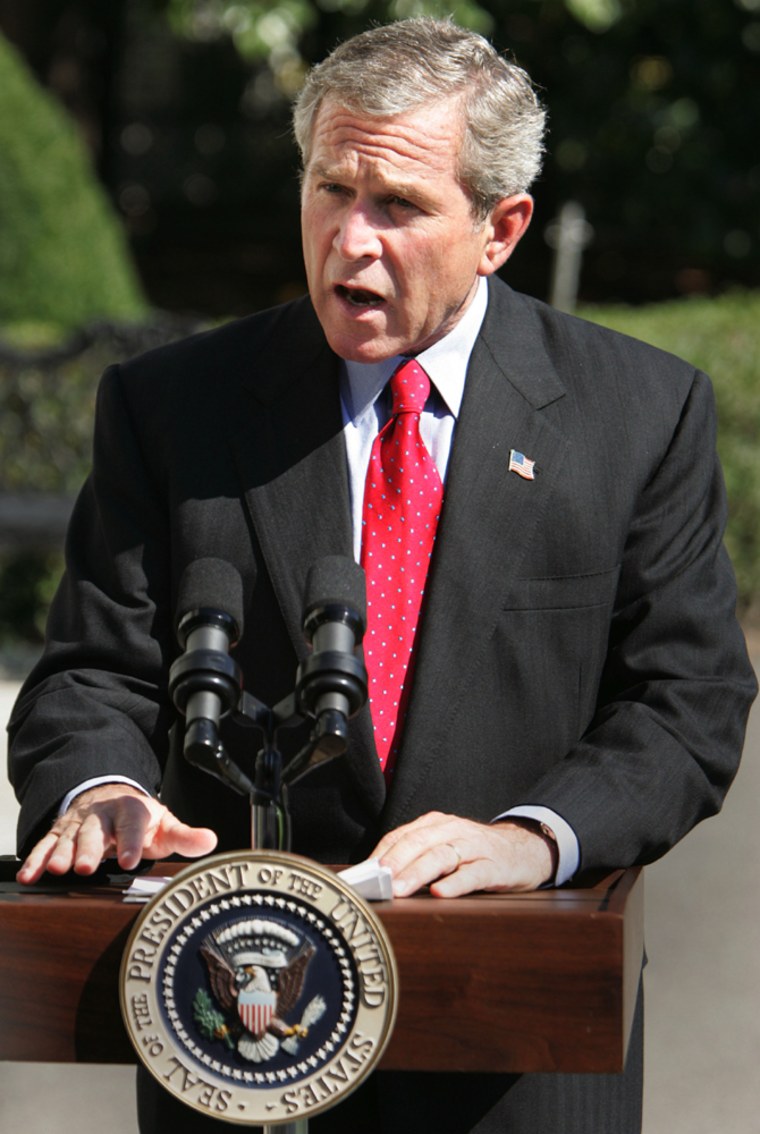George Bush's real political enemy now isn't so much John Kerry as it is the flow of the news. Not long ago, Kerry's decision to attack the president as commander-in-chief (remember all those Swift Boat vets in Boston?) was dismissed by analysts (including me) as naïve at best, folly at worst. Well, it may turn out to have been the move that wins this race.
Presidential campaigns take on a life and shape of their own in the last stretch and this one now has. It's the president desperately trying to tear down Kerry as the news tears down the president. Good things are happening in the war on terrorism — the voting in Afghanistan, for example — but they are all but unnoticed in the rising flood of stories from and about Iraq.
As things now stand, Bush is left with only one argument and justification for having launched a war that has cost 1,000 lives, $150 billion and whatever goodwill America had won in the aftermath of 9/11. His last-resort reason: Saddam Hussein might have developed weapons that he might have given to terrorists that might attack the United States. And even that reasoning is undermined by the new report of the Iraq Survey Group, which says that Saddam's capacities, whatever they might have been, were withering, not "gathering," under the weight of inspections.
We now know to a relative certainty that there were no WMD, no relationship with al-Qaida to speak of, no close ties to other major terrorists, and that, in the view of Paul Bremer — Bush's own man in Baghdad and a fellow Yalie — the Bush administration pretty much botched the occupation.
One new poll out shows that half the American people now think the war in Iraq was a mistake; as that number rises, and it will, Bush's fortunes will decline, as they are now doing. History shows that only one challenger in modern times has been behind in the AP poll on Labor Day and come back to win. That challenger was Ronald Reagan. Now Kerry is no Reagan, not by a long shot. But if people conclude that Bush was profoundly wrong to have gone to Iraq, Kerry doesn't have to be Reagan.
This campaign so far has been almost exclusively, increasingly, about the war in Iraq. On one level, Kerry's "position" is a contradictory bundle of confusion. He says the war was a mistake, but he's the guy calling for a gung-ho strategy in Fallujah to root out terrorist nests. As the president has pointed out, Kerry is claiming he can win the support of allies even as he dismisses the contributions of existing ones and calls the entire war a diversion — and even as France and Germany already have said that they aren't going to rally to our side if Kerry wins. But if the situation in Iraq continues to deteriorate, Kerry's "vision" — or lack of it — matters less.
Many observers have said the Bush team was too smart by half in insisting that the first debate be about foreign policy and defense — that is, Iraq. I am told that this wasn't done out of arrogance or ignorance; it was done that way in part to leave them plenty of time to repair any damage if Bush screwed up. But the problem is that the White House isn't really in control of events. They can wheel in Dick Cheney to make the case for "pre-emptive war" better than the president did — but they can't control what goes on in Iraq, or, just as important, the media coverage of what goes on in Iraq.
Cheney won the veep debate on style points — he was suitably grave and grown up — but as the event fades into obscurity it's clear that John Edwards did what he had to do: Remind voters again and again that Iraq is a flat-out mess.
The focus on Iraq is harmful to the president for another, less obvious reason: It keeps him from shoring up his weaknesses on domestic issues. Most polls show the Democrats and Kerry leading on the most important of those issues: health care. Bush needs to be fighting on that turf. He was planning to do just that in Pennsylvania this week, in a speech about medical malpractice in Wilkes-Barre. But that speech was scrapped in favor of an all-out attack job on Kerry. The switch was revealing and, for Bush, ominous.
The second and third presidential debates will shift the focus — the second, part way to domestic matters; the third, all the way. Bush's aim will be to paint Kerry as an unpalatable liberal who accumulated nothing but bad Big Government ideas during his 19 years in the Senate. Kerry will answer, essentially, "I'm a Democrat." In normal times that would not be a good enough answer, but if the tide of dissatisfaction with Bush as commander-in-chief rises high enough, being a Democrat — in other words not George Bush — may be good enough.
